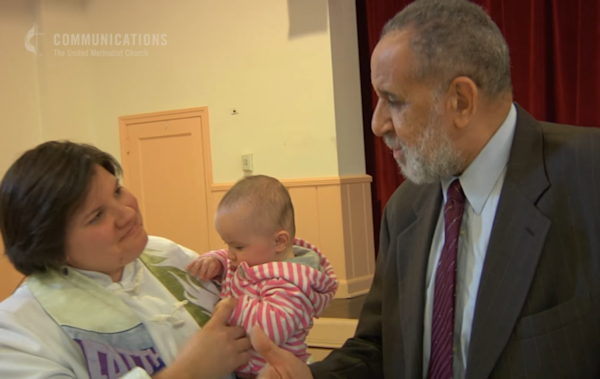The Rev. Gilbert Caldwell aims to keep the Civil Rights Movement alive for the next generation.
He’s one of the foot soldiers who walked alongside civil rights leader Martin Luther King Jr. The Rev. Gil Caldwell also supported voter drives in Mississippi, marched on Washington, and came to the march from Selma to Montgomery at the request of MLK. This lifelong United Methodist and pastor says the civil rights movement inspired his ministry and taught him to advocate for causes beyond race.
Gilbert Haven Caldwell and his father before him were named for a white 19th century Methodist bishop and outspoken abolitionist Gilbert Haven.
The following is a transcript of the video, filmed in Asbury Park, New Jersey (view below).
The Rev. Gilbert Caldwell: “I guess my hope is that the church of the future will be more humble, more Jesus-like, more willing to admit its flaws and the fact that God’s, you know, not finished with us yet.”
Born into a Methodist family 83 years ago, the Rev. Gil Caldwell has witnessed a church that has sometimes struggled.
The Rev. Gilbert Caldwell: “’Lord, I’m not what I ought to be, I’m not what I’m going to be, but Lord, I thank you I’m not what I was.’ And this whole idea that acknowledging that one has moved from one place to a better place, and that I think is what life is all about.”
(Woman talks to Caldwell) “…community members could relate to police officers.”
Caldwell is retired but stays active in a community discussion group he helped start in Asbury Park, New Jersey.
Linda Phillips: “Gil Caldwell to me is a man of principle. He is always saying what he believes and does not fear being the only one in a room who’s saying it.”
And he is glad to share his message…
(Caldwell to church group) “My family says I hand out pictures of Martin King but I’m always in the picture with him, you see.” (laughter)
…to keep the civil rights movement in the minds of the next generation.
(Caldwell to youth) “Have any of you seen the movie ‘Selma’?” (Kid yells) “Yes!”
The 2014 movie “Selma” brings back memories of being there.
The Rev. Gilbert Caldwell: “The black residents of Selma impressed me, as I remember I could feel their support, that we were standing up for them in ways that they could not stand up themselves.”
Daniel Harris: “One thing that we as black people really need, especially for our youth, are people who have made that walk. Reverend Gil, we look at as like a resource, they can look at the movie and look and say, ‘He was there.’”
Child: “Hey, I know you.” Caldwell: “Yeah, I haven’t seen you for a long time.”
Over six decades in The United Methodist Church, Caldwell has served as senior pastor of five predominantly black membership churches, and four mostly white churches. But back in the 1950’s Duke University turned him down.
Instead he attended Boston University as a young seminarian, where he met the Rev. Martin Luther King Jr. Caldwell introduced King at a demonstration on Boston Common.
The Rev. Gilbert Caldwell: “One can never be at rest when one knew Martin King. One of his statements that I just use over and over again, ‘Injustice anywhere is a threat to justice everywhere.’ And for me, the job of the church, of course, is to address these.”
Joining the 1963 March on Washington, spending a Freedom Summer supporting voter drives in Mississippi, and marching from Selma to Montgomery influenced Caldwell and gave him the conviction to speak up.
The Rev. Gilbert Caldwell: “I was involved in picketing and protesting the Methodist church that resulted in the merger of the Central Jurisdiction in 1968. It’s that kind of intertwining, that weaving together of my civil rights experience with my involvement in the Methodist church, that has really been the description of my ministry these many years.”
Gilbert Haven Caldwell and his father before him were named for a white 19th century Methodist bishop and outspoken abolitionist Gilbert Haven. Advocating for change within the church is a family legacy that Caldwell is proud of.
The Rev. Gilbert Caldwell: “I’m greatly bothered by the whole idea of separation and schism. I guess I look at my own black experience. Those of us who stayed rather than departing as our AME and AME Zion brothers did, we stayed with a kind of a hope, with a kind of an optimism that we could be leaven in the loaf. I look at people on all sides of the continuum who talk about leaving the church. It just seems to me that there’s a better way.”
Caldwell is the author of four books and his writings appear in publications from the Boston Globe to the Huffington Post. After all these years, he’s still outspoken, especially on social issues.
The Rev. Gilbert Caldwell: “The other thing that’s been very important to me in the racial justice struggle, the presence of white allies and advocates, people who did not have to be there with us, who in fact ran all kinds of risks not only in the deep South, but among their friends and their families. And I’ve been an ally/advocate for other causes beyond race. I want to be the kind of ally as whites were allies for those of us who are black. And I find that to be very important and very meaningful.”
Last Updated on November 7, 2022

